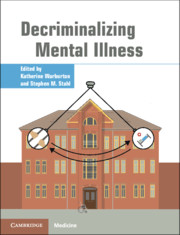Book contents
- Decriminalizing Mental Illness
- Decriminalizing Mental Illness
- Copyright page
- Contents
- Contributors
- Part I Introduction/Description of the Problem
- Part II Solutions
- Chapter 10 Jail Diversion: The Miami Model
- Chapter 11 Jail Diversion: A Practical Primer
- Chapter 12 Principles and Practices of Risk Assessment in Mental Health Jail Diversion Programs
- Chapter 13 Decriminalization in Action: Lessons from the Los Angeles Model
- Chapter 14 Economics of Decriminalizing Mental Illness: When Doing the Right Thing Costs Less
- Chapter 15 Decriminalizing Severe Mental Illness by Reducing Risk of Contact with the Criminal Justice System, Including for Forensic Patients
- Chapter 16 The Cal-DSH Diversion Guidelines
- Chapter 17 Decriminalizing Mental Illness: Specialized Policing Responses
- Part III Psychopharmacological Treatment Considerations
- Part IV Nonpsychopharmacological Treatment Considerations
- Part V Criminal Justice and Social Considerations
- Index
- References
Chapter 10 - Jail Diversion: The Miami Model
from Part II - Solutions
Published online by Cambridge University Press: 19 October 2021
- Decriminalizing Mental Illness
- Decriminalizing Mental Illness
- Copyright page
- Contents
- Contributors
- Part I Introduction/Description of the Problem
- Part II Solutions
- Chapter 10 Jail Diversion: The Miami Model
- Chapter 11 Jail Diversion: A Practical Primer
- Chapter 12 Principles and Practices of Risk Assessment in Mental Health Jail Diversion Programs
- Chapter 13 Decriminalization in Action: Lessons from the Los Angeles Model
- Chapter 14 Economics of Decriminalizing Mental Illness: When Doing the Right Thing Costs Less
- Chapter 15 Decriminalizing Severe Mental Illness by Reducing Risk of Contact with the Criminal Justice System, Including for Forensic Patients
- Chapter 16 The Cal-DSH Diversion Guidelines
- Chapter 17 Decriminalizing Mental Illness: Specialized Policing Responses
- Part III Psychopharmacological Treatment Considerations
- Part IV Nonpsychopharmacological Treatment Considerations
- Part V Criminal Justice and Social Considerations
- Index
- References
Summary
Every day, in every community in the United States, law enforcement agencies, courts, and correctional institutions are witness to a parade of misery brought on by untreated or under-treated mental illnesses. According to the most recent prevalence estimates, roughly 16.9% of jail detainees (14.5% of men and 31.0% of women) experience SMI. Considering that in 2018 law enforcement nationwide made an estimated 10.3 million arrests, this suggests that more than 1.7 million involved people with SMIs. It is estimated that three-quarters of these individuals also experience co-occurring substance use disorders, which increases the likelihood of becoming involved in the justice system. On any given day, approximately 380,000 people with mental illnesses are incarcerated in jails and prisons across the United States.
- Type
- Chapter
- Information
- Decriminalizing Mental Illness , pp. 97 - 105Publisher: Cambridge University PressPrint publication year: 2021

